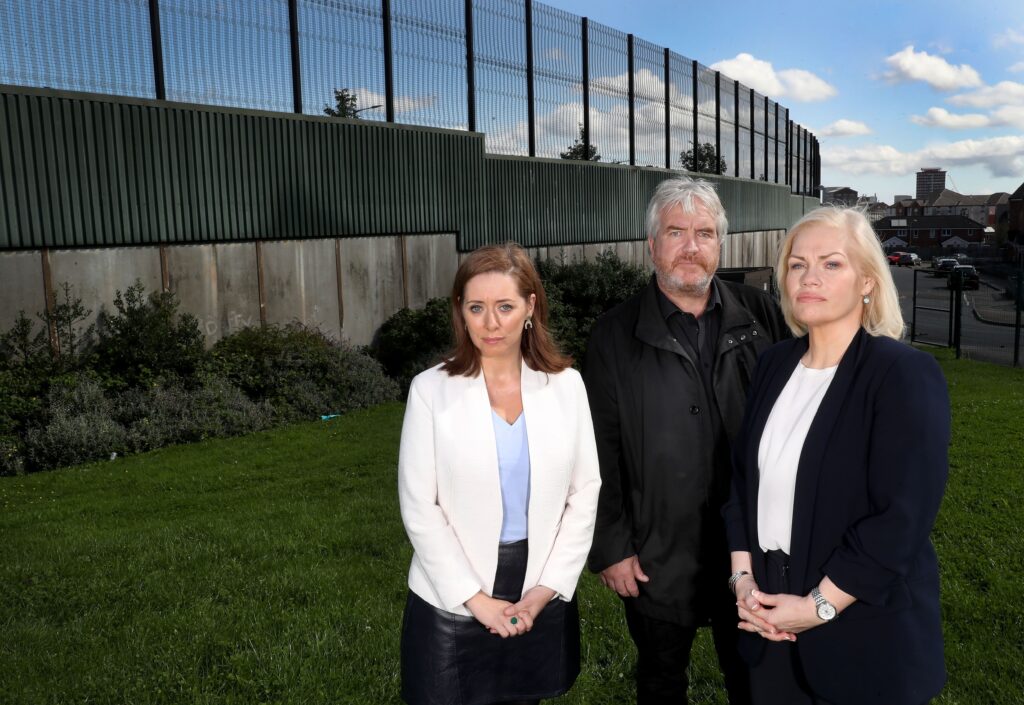As the international documentary film festival Docs Ireland returns to cinemas 25 – 29 August, Jenny McCullough talks to festival programmer Stuart Sloan and highlights 5 films to look out for.
After a slew of cancellations and delays that saw film festivals and events everywhere move online over the past 18 months, Docs Ireland is back in cinemas with a selection of the best documentary film from home and abroad to show in partnership with screens and venues across Belfast.
Festival programmer Stuart Sloan says that although the pivot to online helped the festival to highlight the growth of the “Irish documentary world” and to show world-class talks and panel events to a worldwide audience on a small cash and carbon budget, it’s exciting to see filmmakers sharing their work with a live audience. “In a way”, he says, “in making a film … to watch it with an audience is almost the whole point.”
Stuart’s comment about filmmaking forms a perfect fit with what Northern Slant heard from commercial and community cinemas and film clubs in our ‘The North Stays in the Picture’ series – about the passion of audiences in Northern Ireland for the experience of live cinema.

BBC Northern Ireland’s Spotlight programme will be awarded the Outstanding Contribution to Documentary Film at this year’s festival
What you wouldn’t necessarily see in a normal week in Belfast
Programming and running an in-person film festival in the pandemic era comes with challenges that Stuart is quick to acknowledge. As a result of all the cancelled events, this year’s festival programme reflects a unique opportunity to pick from “a massive pool of films”, including Oliver Sacks: His Own Life, which Stuart has been trying to bring to Belfast for two years. But COVID-19 safety measures make reaching big audiences a stretch:
“All our venues are running at like even less than 50% capacity so there’s a whole bunch of films I would love to have screened, both Irish and international, that I just couldn’t because we didn’t have room for them.”
The reasons for the restrictions are well understood, and Docs Ireland has worked closely with partner venues such as Queen’s Film Theatre (QFT) and Odeon “to do our best with what we’ve got” and make sure that festival audiences can safely and comfortably play their part. They can do this not only in the screenings themselves but the “continuing conversation” of documentary film that, Stuart says, is about “social change … education and empathy … and, most important of all, joy and fun and enjoyment.”
Strong links with international partners have enabled Docs Ireland to screen films from festivals as far afield as Mexico and Taiwan. This aspect of the programme exemplifies the Docs Ireland ethos of “getting films from other parts of the world that you wouldn’t necessarily see in a normal week in Belfast”.
But the programme also encompasses the best of new documentary film from Ireland, North and South, and provides new perspectives on footage and commentary that will be familiar to audiences here. Screenings range from an episode of Channel 4’s After Dark that featured Eamonn McCann taking part in the kind of panel discussion no longer seen in current affairs programming, to a strand celebrating the landmark investigative journalism of BBC Northern Ireland’s Spotlight.

Docs Ireland will screen the critically acclaimed documentary Ryan McMullan: Debut
Understanding global stories through the prism of Ireland
Social justice and equality are important themes for Docs Ireland, and the festival programme provides plenty for audiences in Northern Ireland to think and talk about. For example, Stuart says, the festival will showcase A Worm in the Heart, a film about LGBTQ+ communities in Russia, made by queer Irish filmmaker Paul Rice.
Stuart says that films like this add to understanding and conversation. “That’s what we want to do,” he says. “Especially when we are showing international films or topics: it’s all about contextualising those stories to our local audience, to understand them through the prism of Ireland.”
In-person discussion events at the festival are restricted this year, but Stuart hopes that conversations about the films and the ideas shared will continue at home and when people get to go out and socialise. “That’s what we love to help with,” he says, “and we really hope that it’s happening.”
Sense of purpose
Docs Ireland has a ready-made and much-valued audience of QFT members and others who are already interested in and have access to film. Along with its big sister event the Belfast Film Festival, Docs Ireland efforts to widen participation include a full-time member of staff engaged in outreach and a series of filmmaking projects with marginalised communities across Belfast.
That outreach and inclusion work and the focus of the festival – in common with documentary film more generally – on local and international social issues speaks to a seriousness of purpose. But the festival also takes seriously its responsibility for channelling the power of film to provide pure enjoyment and escape.
One of Docs Ireland’s opening events is a special outdoor screening of Jazz on a Summer’s Day, a concert film from 1958 with performances by Louis Armstrong, Chuck Berry, Dinah Washington and other great musicians.
Stuart says of the film, “You don’t even have to think about 2021 for a second … You can go back to worrying about the world afterwards, but for those 90 minutes you can enjoy the moment.” Whilst it’s very different from many of the films on show, then, in one way at least it sets the scene for the return of Docs Ireland:
“It just looks incredible, it really does. On a massive screen with the sun setting, it should be great.”
Docs Ireland: 5 Films to Look Out For
Bank Job (27 August – 9:00pm – QFT Screen 2)
Filmmaker team Dan Edelstyn and Hilary Powell bring together a local community to examine how money and debt are made in our economic system and to look for alternatives that work in the public’s favour.
The “rebel bank” has printed its own money and used it to raise funds, buying up millions of pounds worth of local debt that in turn funds local food banks, homeless kitchen, youth spaces and schools.
Spotlight at 40 (29 August – 12:00pm – Ulster Museum)
Since 1973, BBC’s Spotlight’s ground-breaking investigations have examined a range of socio-political issues in Northern Ireland, holding politicians to account on behalf of the public. This special edition, presented by Declan Lawn, delves into the programme’s archives.
The documentary pays tribute to some of Northern Ireland’s hardest-hitting journalism and marks Spotlight’s latest accolade: the Docs Ireland Outstanding Contribution to Documentary Film award.
Her Socialist Smile (28 August – 3:30pm – QFT Screen 2)
John Gianvito explores the extraordinary life of author, lecturer and activist Helen Keller in a film that features her most famous speeches along with a newly recorded voiceover by poet Carolyn Forché.
Helen Keller lost her sight and hearing at the age of 19 months. A persistent advocate for deafblind people, she was perceived as a “radical” for her ideals of better working conditions and fair pay and the need to end child labour and uphold racial equality. As a suffragist, Keller also spoke fervently about the rights of women, international socialism and world peace.
Writing with Fire (27 August – 8:45pm – QFT Screen 1)
Rintu Thomas and Sushmit Ghosh’s documentary follows the journalists of India’s only Dalit women-run newspaper as they investigate murders and expose sexual violence. Based on the news outlet’s reports, rapists have been prosecuted, roads have been built and a marginalised community has got access to medicine. The film shows Chief Reporter Meera and her team continuing to break stigma and push boundaries as they adapt to digital journalism.
For this screening, the directors will join Docs Ireland online to be interviewed by journalist Amanda Ferguson.
Notturno (26 August – 8:30pm – QFT Screen 2)
This documentary by filmmaker Gianfranco Rosi provides an insight into everyday life on the borders between Iraq, Kurdistan, Syria and Lebanon in the aftermath of years of violence and instability.
Rosi’s unique focus is on those who have suffered in conflict. The film jumps between countries without spelling out which they are – reflecting on the meaning of borders when terror is rife among neighbouring countries.
